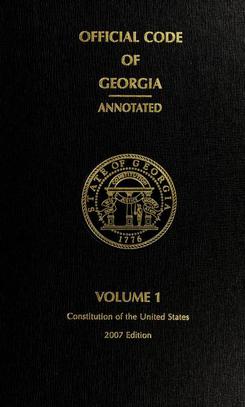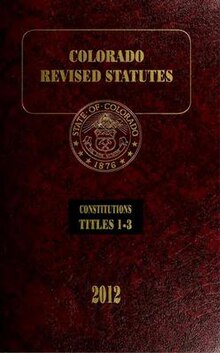
The Official Code of Georgia Annotated or OCGA is the compendium of all laws in the U.S. state of Georgia. Like other U.S. state codes, its legal interpretation is subject to the United States Constitution, the United States Code, the Code of Federal Regulations, and the state's constitution. It is to the state what the United States Code (U.S.C.) is to the federal government.

The Congressional Research Service (CRS) is a public policy research institute of the United States Congress. Operating within the Library of Congress, it works primarily and directly for members of Congress and their committees and staff on a confidential, nonpartisan basis. CRS is sometimes known as Congress' think tank due to its broad mandate of providing research and analysis on all matters relevant to national policymaking.

Carl Malamud is an American technologist, author, and public domain advocate, known for his foundation Public.Resource.Org. He founded the Internet Multicasting Service. During his time with this group, he was responsible for developing the first Internet radio station, for putting the U.S. Securities and Exchange Commission's EDGAR database on-line, and for creating the Internet 1996 World Exposition.

West is a business owned by Thomson Reuters that publishes legal, business, and regulatory information in print, and on electronic services such as Westlaw. Since the late 19th century, West has been one of the most prominent publishers of legal materials in the United States. Its headquarters is in Eagan, Minnesota; it also had an office in Rochester, New York, until it closed in 2019, and it had an office in Cleveland, Ohio, until it closed in 2010. Organizationally, West is part of the global legal division of Thomson Reuters.

The Government of Colorado is the governmental structure as established by the Constitution of the State of Colorado. It is composed of three branches: the executive branch headed by the Governor, the legislative branch consisting of the General Assembly, and the judicial branch consisting of the Supreme Court and lower courts. The constitution also allows direct participation of the electorate by initiative, referendum, recall and ratification.
The Ohio Revised Code contains all current statutes of the Ohio General Assembly of a permanent and general nature, consolidated into provisions, titles, chapters and sections. However, the only official publication of the enactments of the General Assembly is the Laws of Ohio; the Ohio Revised Code is only a reference.

Jeralyn Elise Merritt is an American criminal defense attorney in private practice in Denver, Colorado, since 1974. She served as one of the trial lawyers for Timothy McVeigh in the Oklahoma City bombing case in 1996 and 1997. In 2002 Merritt founded and is the principal author of the blog TalkLeft: The Politics of Crime. She also serves as a legal commentator for news media programs and as an internet journalist.
Edict of government is a technical term associated with the United States Copyright Office's guidelines and practices that comprehensively includes laws, which advises that such submissions will neither be accepted nor processed for copyright registration. It is based on the principle of public policy that citizens must have unrestrained access to the laws that govern them. Similar provisions occur in most, but not all, systems of copyright law; the main exceptions are in those copyright laws which have developed from English law, under which the copyright in laws rests with the Crown or the government.
The copyright status of works produced by the governments of states, territories, and municipalities in the United States varies. Copyright law is federal in the United States. Federal law expressly denies U.S. copyright protection to two types of government works: works of the U.S. federal government itself, and all edicts of any government regardless of level or whether or not foreign. Other than addressing these "edicts of government", U.S. federal law does not address copyrights of U.S. state and local government.
The law of Colorado consists of several levels, including constitutional, statutory, regulatory, local, and case law. The Colorado Revised Statutes form the general statutory law.
The law of Illinois consists of several levels, including constitutional, statutory, and regulatory law, as well as case law and local law. The Illinois Compiled Statutes (ILCS) form the general statutory law.
The law of Pennsylvania consists of several levels, including constitutional, statutory, regulatory and case law. The Pennsylvania Consolidated Statutes form the general statutory law.
The law of Ohio consists of several levels, including constitutional, statutory, and regulatory, local and common law. The Ohio Revised Code forms the general statutory law.
The law of the U.S. state of Georgia consists of several levels, including constitutional, statutory, and regulatory law, as well as case law and local law. The Official Code of Georgia Annotated forms the general statutory law.
The law of Michigan consists of several levels, including constitutional, statutory, regulatory and case law. The Michigan Compiled Laws form the general statutory law.
The law of New Jersey consists of several levels, including constitutional, statutory, regulatory, case law, and local law.
The law of Washington consists of several levels, including constitutional, statutory, regulatory and case law, as well as local ordinances. The Revised Code of Washington forms the general statutory law.
The Illinois Compiled Statutes (ILCS) are the codified statutes of a general and permanent nature of Illinois. The compilation organizes the general Acts of Illinois into 67 chapters arranged within 9 major topic areas. The ILCS took effect in 1993, replacing the previous numbering scheme generally known as the Illinois Revised Statutes, the latest of which had been adopted in 1874 but appended by private publishers since.
Georgia v. Public.Resource.Org, Inc., No. 18-1150, 590 U.S. ___ (2020), is a United States Supreme Court case regarding "whether the government edicts doctrine extends to—and thus renders uncopyrightable—works that lack the force of law, such as the annotations in the Official Code of Georgia Annotated" (OCGA). On April 27, 2020, the Court ruled 5–4 that the OCGA cannot be copyrighted because the OCGA's annotations were "authored by an arm of the legislature in the course of its legislative duties"; thus the Court found that the annotations fall under the government edicts doctrine and are ineligible for copyright.






